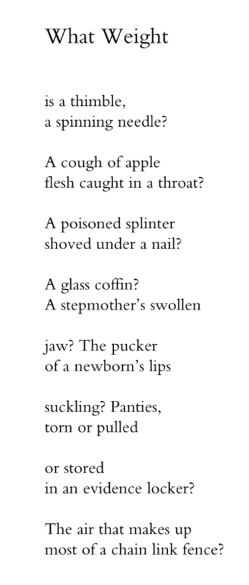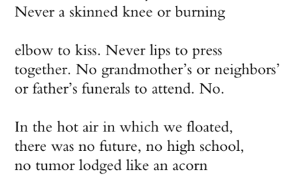 Review by Ana C.H. Silva
Review by Ana C.H. Silva
From the very title of her latest full-length poetry collection, Sweetbitter (Sundress 2021), we understand that Stacey Balkun will purposefully use the power of syntax to open up stories. Her subject matter is, in part, the lives of 90s adolescent girls in Possumtown, NJ; the effects of a chemical plant and atomic testing on a community; the way stories have power over us and, ultimately, how we also have power over our stories. Balkun skillfully uses the contrapuntal form, the technique of erasure (of 90s rock lyrics, of engineering documents, newspaper articles), and many other devices as she deliberately re-juxtaposes language in exciting, expressive new compressions.
Balkun’s opening poem, “The Water, the Truth, the Water,” orients us well to this compulsive, high-wired read. Its epigraph reads:
Located fewer than 500 feet from the former sight of the Wynnewood Swim Club in Piscataway, NJ is the chemical pond used by Union Carbide during the active phase of plant operation.
Her use of the contrapuntal form, which allows us to read poems both across and in two columns, is never fussy, forces us to pause and absorb more layers of complexity before quickly moving the action of the poem forward with the collection’s characteristic urgency. In this first poem, the left column is hosted by the “I”, a walk “through the familiar neighborhood behind the pool”, while the column to the right is hosted by “possum-girl/ past the NO TRESSPASSING signs”. The distinct voices ultimately unite in their urgency, in their interest to collect narrative made of sharp-edged shards of found facts and memory.
Sweetbitter’s setting takes on the ineffably unnerving vibe of the suburbs echoed in the nervous edge of our protagonist who doesn’t quite know what is below the surface, which dangers lurk under the footholds of puberty benchmarks, beneath the earth she walks. The forest is rich and animated, filled with animals, hunger, the fear of people, the solidity of itself and its own secrets. Temptations of all kinds salt this collection: sugar, sex, the promise of fairy-tales that live in our heads but don’t sustain, that don’t grow to fruition, that do crash. The Possum-girl has a friend, Apple-Child, and together, pockets filled with rocks and Plan B, they explore the pitfalls of their own danger-edged adventures and interrogate the stories they have been fed in the context of land that breathes out hints of the breach waiting to be revealed:

The genre of this collection is unique, partly coming of age, partly eco-poetry, with that fairytale surrealism, and even a touch of horror and filmic play. Little Red Riding Hood’s cape appears as a tight red dress in one poem and her woods as a superfund site and a brownfield in another poem. A girl is running and “running again and again and again” at the end of one poem that suggests an endless loop, a stall in time, perhaps even a time-lapse film. One poem, “Being the Girl Not the Princess”, whose ending is syntactically incomplete, seems to perpetually point the reader back to the poem’s beginning. Balkun’s poems’ surfaces are slick, giving way to a fall, to a hard reality. Ultimately, though, even as she lays bare their struggles, Balkun commits to embodying and portraying the tender, brave agency of the adolescent girl protagonists. These girls are grabbing at pants, not just being coaxed out of dresses; the attraction to the boys they tussle with– those poking, fighting, fire-wielding hunters – is mutual, if messy. The collection turns Sapphic in a tender poem that interweaves the fear of the undervalued mushroom, these fantastic, delicate fruits of the earth, with the moment their love opens; chanterelle as clitorus; the way these golden unfoldings are often instinctively hidden away, feared.
I was reminded of the task that Angela Carter gave herself as she wrote her famed The Bloody Chamber: “to extract the latent content from the traditional stories and to use it as the beginnings of new stories.” Similarly, beyond offering resistance and critique, in “What Weight,” Balkun seems in part to unfurl the recognition of the threat of bodily harm against women folded into the imagery of the fairytales we tell our children:

As only a poet can do so deftly, Balkun interrupts both reality and time with a handful of defiant “No”s that erase the wrongs of the radiated, oil-slicked world Possum-girl travels in “No Books Would Tell Us Our Stories”:

Reading Balkun’s collection offers multiple adventures for the reader, many of which will bear only slight resemblance to this version; its polluted groundwater, fairytale-laden chemical ponds, ripped-up lyrics, Possum-girl trampled apple-strewn soil is that rich.
Stacey Balkun is the author of SWEETBITTER (Sundress 2021) & co-editor of Fiolet & Wing: An Anthology of Domestic Fabulist Poetry. Winner of the 2019 New South Writing Contest as well as Terrain.org’s 10th Annual Contest, her work has appeared in Best New Poets 2018, Crab Orchard Review, The Rumpus, & several other anthologies & journals. Stacey holds an MFA from Fresno State and teaches creative writing online at The Poetry Barn & The Loft. Visit her online at http://www.staceybalkun.com.
Sweetbitter by Stacey Balkun
Sundress 2022
Paper, 92 pages.
ISBN-13 : 978-1951979287
Ana C.H. Silva lives in NYC and the Catskills. Her poems live in various print and online journals. She won the inaugural Rachel Wetzsteon Memorial Poetry Prize at the 92nd St. Y Unterberg Poetry Center. Her chapbooks are: One Cupped Hand Above the Other, with Dancing Girl Press, and While Mercury Fish, with Finishing Line Press.
